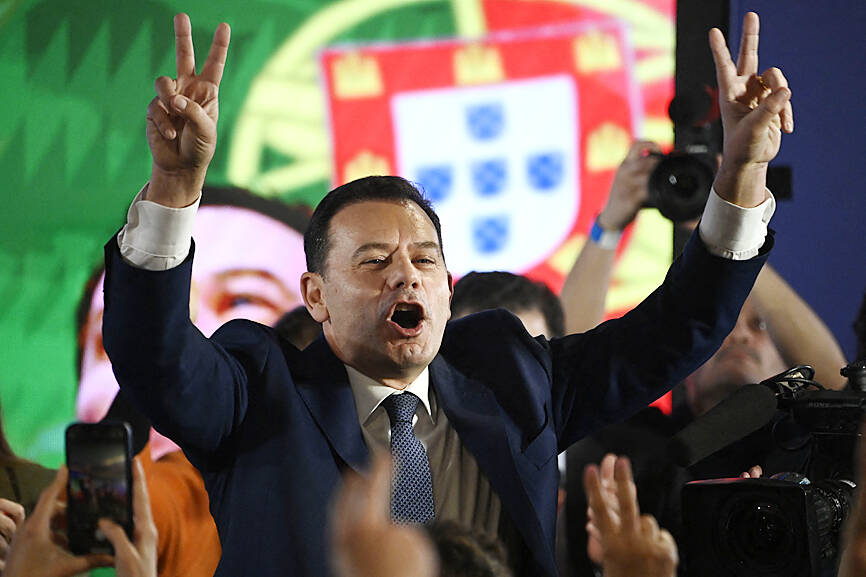Portugal yesterday looked set for a period of political uncertainty after no party won a majority in the election at the weekend and the far-right surged into the role of potential kingmaker.
The center-right Democratic Alliance (AD), which won the most seats in Sunday’s vote, is expected to be tapped in the coming days to try to form a government.
The AD beat the incumbent Socialist Party (PS), but took just 79 seats — far short of a majority in the 230-seat parliament.

Photo: AFP
Even with the backing of tiny business-friendly party Liberal Initiative, the AD would still need the support of anti-immigration party Chega to reach a majority of 116 seats.
Chega posted the biggest gains, winning 48 seats, up from just 12 in the previous election in 2022, cementing its position in Portugal’s political landscape.
Chega has demanded to be part of a rightist coalition government in exchange for parliamentary support, but AD leader Luis Montenegro repeatedly ruled out any post-election agreement with the party branded as xenophobic by its critics.
An AD minority government “could face significant obstacles to legislating over time and require support on a case-by-case basis,” said Javier Rouillet of ratings agency Morningstar DBRS.
“If the new government is unable to pass legislation, this could raise the prospect of another round of elections later this year or early next year,” he said.
The passage of next year’s budget would likely constitute “the first major test” for an AD-led minority government, Rouillet said.
While Socialist leader Pedro Nuno Santos has said his party would refrain from bringing down a center-right minority government, he warned it would vote against its first budget.
“We will be the opposition, we will renovate the party and we will seek to win back Portuguese who are dissatisfied with the PS,” he said.
The AD campaigned on promises to boost economic growth by slashing taxes, which the Socialists had warned would require cuts to pensions and other social spending.
“We know the challenge is great. It is going to demand a great sense of responsibility, a great capacity for dialogue,” Montenegro said in his victory speech.
He would now likely come under considerable pressure from his own party to reach some sort of agreement with Chega. Some top AD officials, such as former Portuguese prime minister Pedro Passos Coelho, have been more ambivalent about working with the party.
The election results mark another advance for the far right in Europe, where they already govern — often in coalition — in nations such as Italy, Hungary and Slovakia, or are steadily gaining, as in France and Germany.
Chega, which means “Enough,” has called for stricter controls over immigration, tougher measures to fight corruption and chemical castration for some sex offenders.
Just five-years-old, Chega picked up its first seat in Portugal’s parliament in 2019. It was the first far-right party to win representation in the assembly since a military coup in 1974 toppled a decades-long right-wing dictatorship.
There are still four seats left to be assigned representing Portuguese who live abroad, but those results would not be known for days. They have traditionally gone mostly to the center-right.

The CIA has a message for Chinese government officials worried about their place in Chinese President Xi Jinping’s (習近平) government: Come work with us. The agency released two Mandarin-language videos on social media on Thursday inviting disgruntled officials to contact the CIA. The recruitment videos posted on YouTube and X racked up more than 5 million views combined in their first day. The outreach comes as CIA Director John Ratcliffe has vowed to boost the agency’s use of intelligence from human sources and its focus on China, which has recently targeted US officials with its own espionage operations. The videos are “aimed at

STEADFAST FRIEND: The bills encourage increased Taiwan-US engagement and address China’s distortion of UN Resolution 2758 to isolate Taiwan internationally The Presidential Office yesterday thanked the US House of Representatives for unanimously passing two Taiwan-related bills highlighting its solid support for Taiwan’s democracy and global participation, and for deepening bilateral relations. One of the bills, the Taiwan Assurance Implementation Act, requires the US Department of State to periodically review its guidelines for engagement with Taiwan, and report to the US Congress on the guidelines and plans to lift self-imposed limitations on US-Taiwan engagement. The other bill is the Taiwan International Solidarity Act, which clarifies that UN Resolution 2758 does not address the issue of the representation of Taiwan or its people in

US Indo-Pacific Commander Admiral Samuel Paparo on Friday expressed concern over the rate at which China is diversifying its military exercises, the Financial Times (FT) reported on Saturday. “The rates of change on the depth and breadth of their exercises is the one non-linear effect that I’ve seen in the last year that wakes me up at night or keeps me up at night,” Paparo was quoted by FT as saying while attending the annual Sedona Forum at the McCain Institute in Arizona. Paparo also expressed concern over the speed with which China was expanding its military. While the US

SHIFT: Taiwan’s better-than-expected first-quarter GDP and signs of weakness in the US have driven global capital back to emerging markets, the central bank head said The central bank yesterday blamed market speculation for the steep rise in the local currency, and urged exporters and financial institutions to stay calm and stop panic sell-offs to avoid hurting their own profitability. The nation’s top monetary policymaker said that it would step in, if necessary, to maintain order and stability in the foreign exchange market. The remarks came as the NT dollar yesterday closed up NT$0.919 to NT$30.145 against the US dollar in Taipei trading, after rising as high as NT$29.59 in intraday trading. The local currency has surged 5.85 percent against the greenback over the past two sessions, central